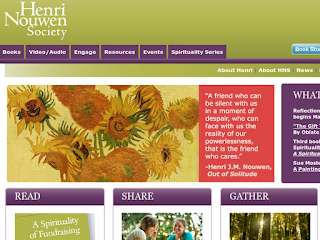I've begun regularly adding 'Questions' and 'See also' sections at the end of blog posts. Both are intended to make the articles more useful.
An invitation to respond - I've noticed how some other bloggers include open questions at the end of their articles and it's been really helpful.
For one thing it encourages me to think for myself when I've finished reading. It's so easy to read something and then move straight on, but the questions interrupt that automatic urge to see what's next and instead provoke me to think through the implications of what has been written.
Sometimes I leave a comment purely because one of the questions has helped me to agree or disagree with something the author has written, or has taken me beyond what is mentioned in the article.
A list of links - I've also noticed 'See also' sections in some blogs, but this seems less widespread than the inclusion of questions. However, from now on my intention is to provide links in the 'See also' section for every post.
Some bloggers only post links to their own articles, but I'm going to try to link to other blogs and websites too. Expect to find links to other relevant blog articles, Wikipedia articles for topic overviews, recent articles from news organisations, and other stuff that seems relevant from time to time. For completeness the list always includes the links provided in the main body of the blog post.
It's my hope that readers will use the links to explore a trail from one blog post to another, not just within my own blog but much more widely.
I encourage other bloggers to pick up this idea and run with it. If enough of us engage in this rich linking all our blog articles will act as entry points into the wider discussion. It would be very helpful to our readers and it would also bind us into a wide and deep community of writers, commentators and commenters. Along with chain blogs and synchroblogs it would help us transcend the boundaries of individual blogging.
Organic Wine - Some time ago I set up an area on this site called 'Organic Wine'. It has its own tab below the banner. The idea was that this would list links to specific topics that are important to me, specifically around the subject of church in general and organic church in particular.
I haven't kept this up-to-date recently and I hope that the lists of links in articles will be a more flexible way of achieving the same end - linking to relevant material elsewhere in the blogosphere.
We'll see how it goes. If, over a period of time, the new linking arrangement seems successful I may freeze the 'Organic Wine' feature permanently and eventually take the dedicated tab away.
Previous, Next and Index - I have always added these links to the top and bottom of articles where they're part of a series. These links always refer to other posts on 'Journeys of heart and mind'.
When I write a series on a particular theme it's particularly useful for readers to be able to skip to the previous and next articles in the series. It's also useful to see a list of the entire series on a single page (the index). Doing it this way also means the series does not need to be continuous, I can intersperse stand-alone articles that have nothing to do with the series.
To see this in action, here's a list of the series index pages on this blog.
Questions:
- Do you find the 'Questions' section useful? How? Why?
- Do you find the 'See also' section useful? How? Why?
- Do you think I should continue with 'Organic Wine' or not?
- If you're a blogger, do you think you might begin cross-linking in a similar way?
- Are there other ways we could make blog articles more useful to our readers?
See also:
- Index to themed articles - Journeys of heart and mind
- Interested in a chain blog? - The assembling of the church
- Organic Wine - Journeys of heart and mind
- Synchroblog
- The art of questioning - Institute for enquiry
- Using questions in teaching - Oxford Brookes University






